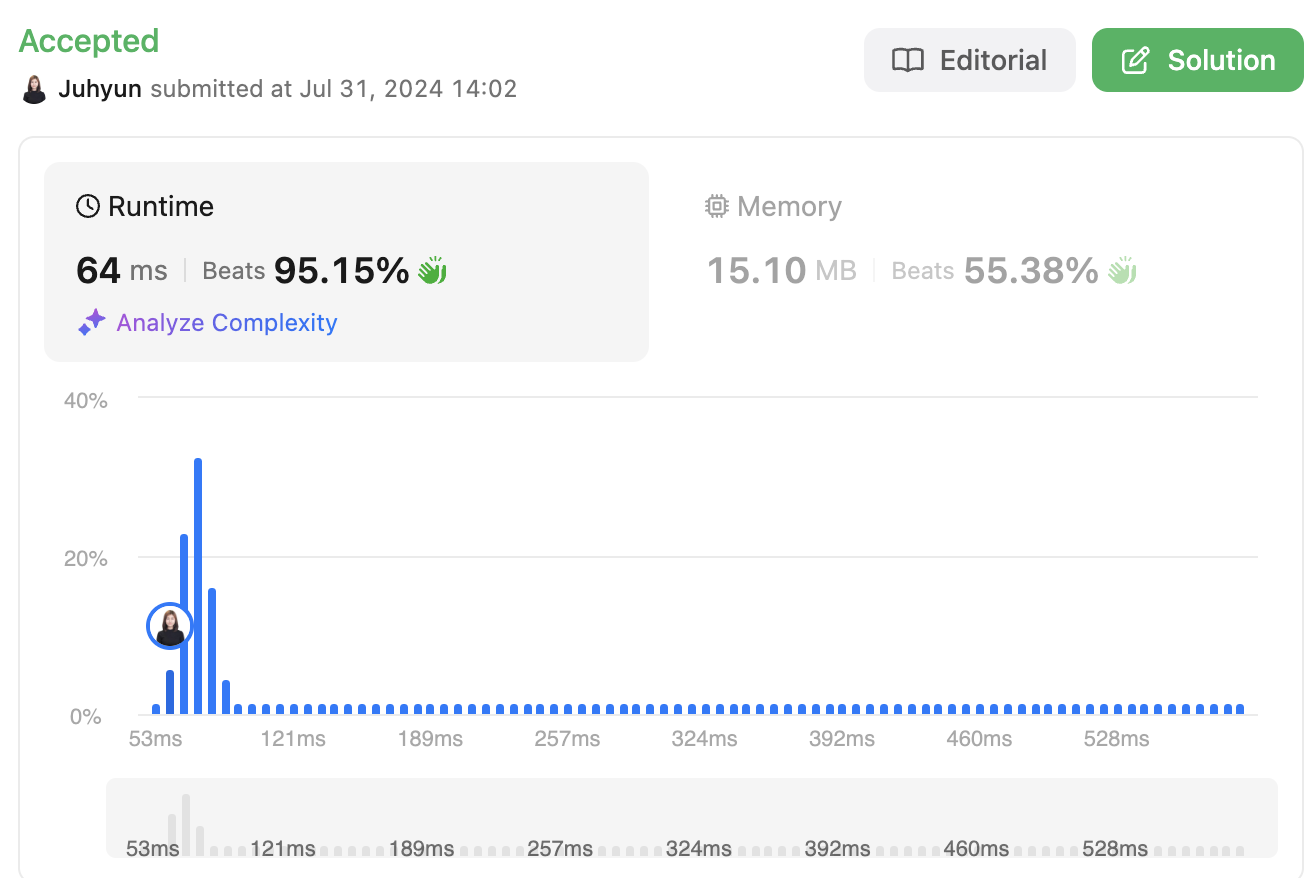one line of code at a time
[leetcode] 347. Top K Frequent Elements 파이썬 코드 본문
이 문제는 제목에 그대로 나와있다. 숫자 배열이 주어지면 그 중에서 가장 빈번하게 (많이) 등장한 숫자를 반환하면 된다.
문제를 풀 때 숫자가 몇 번 나왔는지를 카운트하고 그것을 딕셔너리에 저장한 다음에 어떻게 해야 하는지 막혔다.
그래서 다른 사람들의 풀이를 보았다.
첫 번째, bucket sort.
숫자 배열이 주어지면 그 배열의 길이를 알 수 있다. 그리고 element가 아무리 많이 등장해도 (배열의 길이)번 만큼만 등장할 수 있다.
그러면 개수를 key로, 그만큼 등장한 숫자를 value에서 배열로 저장하는 방법이 있다.
1이 몇 개, 2가 몇 개... 이렇게 개수(count)를 value로 두었는데 개수(count)를 key로 가져간다는 게 새로웠다.
| count | 0 | 1 | 2 | 3 | ... | K-2 | K-1 | K |
| [3] | [1, 2] |
간단하게 코드를 작성하면 다음과 같다.
# top k frequent elements
nums = [1,1,1,2,2,3]
bucket = [[] for i in range(len(nums)+1)] # [[], [], [], [], [], [], []]
num_count = dict()
print(bucket)
for i in range(len(nums)):
if nums[i] in num_count:
num_count[nums[i]] += 1
else:
num_count[nums[i]] = 1
print(num_count)
for value, count in num_count.items():
bucket[count].append(value)
print(bucket)

class Solution(object):
def topKFrequent(self, nums, k):
"""
:type nums: List[int]
:type k: int
:rtype: List[int]
"""
bucket = [[] for i in range(len(nums)+1)]
num_count = dict()
for i in range(len(nums)):
if nums[i] in num_count:
num_count[nums[i]] += 1
else:
num_count[nums[i]] = 1
for value, count in num_count.items():
bucket[count].append(value)
result = []
for idx in range(len(bucket)-1, 0, -1):
for num in bucket[idx]:
result.append(num)
if len(result) == k:
return result

두 번째, heap
from collections import Counter
import heapq
class Solution(object):
def topKFrequent(self, nums, k):
"""
:type nums: List[int]
:type k: int
:rtype: List[int]
"""
counter = Counter(nums)
heap = []
result = []
for num, count in counter.items():
if len(heap) < k:
heapq.heappush(heap, (count, num))
else:
heapq.heappushpop(heap, (count, num))
for tupl in heap:
result.append(tupl[1])
return result

참고
'leetcode' 카테고리의 다른 글
| [leetcode] 704. Binary Search 파이썬 코드 (0) | 2024.08.01 |
|---|---|
| [leetcode] 49. Group Anagrams 파이썬 코드 (0) | 2024.08.01 |
| [leetcode] 242. Valid Anagram 파이썬 코드 (0) | 2024.07.10 |
| [leetcode] 226. Invert Binary Tree 파이썬 코드 (0) | 2024.07.03 |
| [leetcode] 133. Clone Graph 파이썬 코드 (0) | 2024.07.02 |


